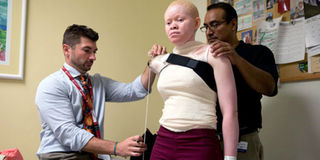Albino girl gets artificial hand, returns home

Lance Harms (left) and Luis Velasquez (right) fit Ms Kabula Masanja, 17, being prepared for a prosthetic limb at the Shriners Hospital for Children in Philadelphia US recently. Ms Kabula arrived in Dar es Salaam yesterday. PHOTO | Agencies
What you need to know:
People with albinism live in constant fear of being attacked by those who think that they can use their body parts to enrich themselves
At least 76 albinos have been murdered in Tanzania since 2000, the fear is real especially in days ahead of elections
Dar es Salaam/New York. One of the five Tanzanian children with albinism whose hands were chopped off due to superstitious beliefs returned this week with an American artificial arm (prosthetic).
Ms Kabula Masanja, 17, got the prosthetic after doctors at Shriners Hospital for Children in Philadelphia created new artificial limbs for her and four other youngsters.
Ms Masanja left the US on Tuesday and flew back to Dar es Salaam after about two months at State-land, where she was undergoing arm-replacement.
She lost her right arm to thugs who held her down at her home in Shinyanga Region. Giving her testimony to the media, Kabula recalled how the unknown men attacked her in a night raid.
Apparently, the attackers initially demanded money from her family, but they didn’t have any. Her mother offered them the family’s bicycle instead, as it was their only item of value, she told AFP.
The thugs refused it and held down Kabula, hacking off her right arm to the armpit in three swipes, reports further said.
Before leaving with the limb in a plastic bag, the attackers told Kabula’s mother that another group of men would return to take her daughter’s organs. A threat that sounded so real, and still does.
“I feel bad because I still don’t know what they did with my arm, and where it is,’’ said Kabula.
“I also don’t know what benefits they derived from it,” she further told AFP.
Ms Masanja and other four children aged between 5 and 15 were fitted with the prostheses, thanks to the support offered by a charity known as the Global Medical Relief Fund, which was founded about 18 years ago to help young people from crisis zones get custom prostheses.
But of all the horrifying stories on albino attacks in Tanzania, it’s the story of 5-year old Baraka Cosmas from Shinyanga which prompted the founder of the charity, Ms Ellisa Mountani, to arrange for the prosthetics programmes.
Men broke into Baraka’s family home, knocked his mother unconscious and cut off his right hand with a machete, according to local media.
They did the inhuman act because Baraka has albinism, a condition that renders those affected mostly devoid of pigment in their skin, hair and eyes.
People (and animals – the disorder affects all). It’s due to the lack of tyrosinase, an enzyme that contains copper and is necessary for the body’s production of melanin.
After reading about Baraka’s story, she reached out to a Canada-based group called Under the Same Sun that works on behalf of people with albinism in Tanzania.
Recently, Baraka was fitted with his prosthesis - and he poked at the flesh-coloured plastic right hand as it lay beside him on the examination table, AP said.
His atrophied right arm was barely able to lift the prosthesis, but that is to be expected - it will grow stronger once the prosthetic hand is in place, according to experts attending him.
Ms Mountani has been sheltering Baraka since he was attacked in March, and she wanted to help out the kid, together with others afflicted in the heinous attacks.
The New York resident provided housing about two hours away in the borough of Staten Island and organized all their daily, medical and travel need.
For Ms Masanja, she returned home and she is ready for school programmes. The other children will be returning in late September. And they’ll be back next year for new prostheses matching their growth, AFP reported.
Once the five children in the US are comfortable with their new limbs they will now be sent to the safe houses here in Tanzania run by the NGO, Under the Same Sun.
Human rights groups, some campaigners and international agencies have called for the protection of people with albinism all over the world, especially in some African countries where they are hunted for superstitious beliefs.
They recently warned of the risk of the rise in the attacks on albinos especially during this election season in Tanzania, where campaigns have kicked off for the civic, parliamentary and presidential seats.
At least 76 albinos have been murdered in Tanzania since 2000, with their dismembered body parts selling at around $600 and entire body fetching $75,000, according to United Nations experts.
The Tanzanian government outlawed witch doctors last year to try and curtail the attacks, but the new law hasn’t stopped the butchering.
In fact there has been a sharp increase in attacks in Tanzania and neighbouring Malawi, said a UN official recently, with Tanzania recording at least eight attacks in the past year.
Albinism affects about one out of every 15,000 people in Tanzania, according to the United Nations. Anyone with the condition is at risk in the country, and people who have been attacked once, can be attacked again.




